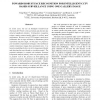Free Online Productivity Tools
i2Speak
i2Symbol
i2OCR
iTex2Img
iWeb2Print
iWeb2Shot
i2Type
iPdf2Split
iPdf2Merge
i2Bopomofo
i2Arabic
i2Style
i2Image
i2PDF
iLatex2Rtf
Sci2ools
256
click to vote
AVSS
2007
IEEE
2007
IEEE
Towards robust face recognition for Intelligent-CCTV based surveillance using one gallery image
In recent years, the use of Intelligent Closed-Circuit Television (ICCTV) for crime prevention and detection has attracted significant attention. Existing face recognition systems require passport-quality photos to achieve good performance. However, use of CCTV images is much more problematic due to large variations in illumination, facial expressions and pose angle. In this paper we propose a pose variability compensation technique, which synthesizes realistic frontal face images from non-frontal views. It is based on modelling the face via Active Appearance Models and detecting the pose through a correlation model. The proposed technique is coupled with Adaptive Principal Component Analysis (APCA), which was previously shown to perform well in the presence of both lighting and expression variations. Experiments on the FERET dataset show up to 6 fold performance improvements. Finally, in addition to implementation and scalability challenges, we discuss issues related to on-going rea...
AVSS 2007 | Face Recognition Systems | Pose Variability Compensation | Realistic Frontal Face | Signal Processing |
Related Content
| Added | 02 Jun 2010 |
| Updated | 02 Jun 2010 |
| Type | Conference |
| Year | 2007 |
| Where | AVSS |
| Authors | Ting Shan, Shaokang Chen, Conrad Sanderson, Brian C. Lovell |
Comments (0)

